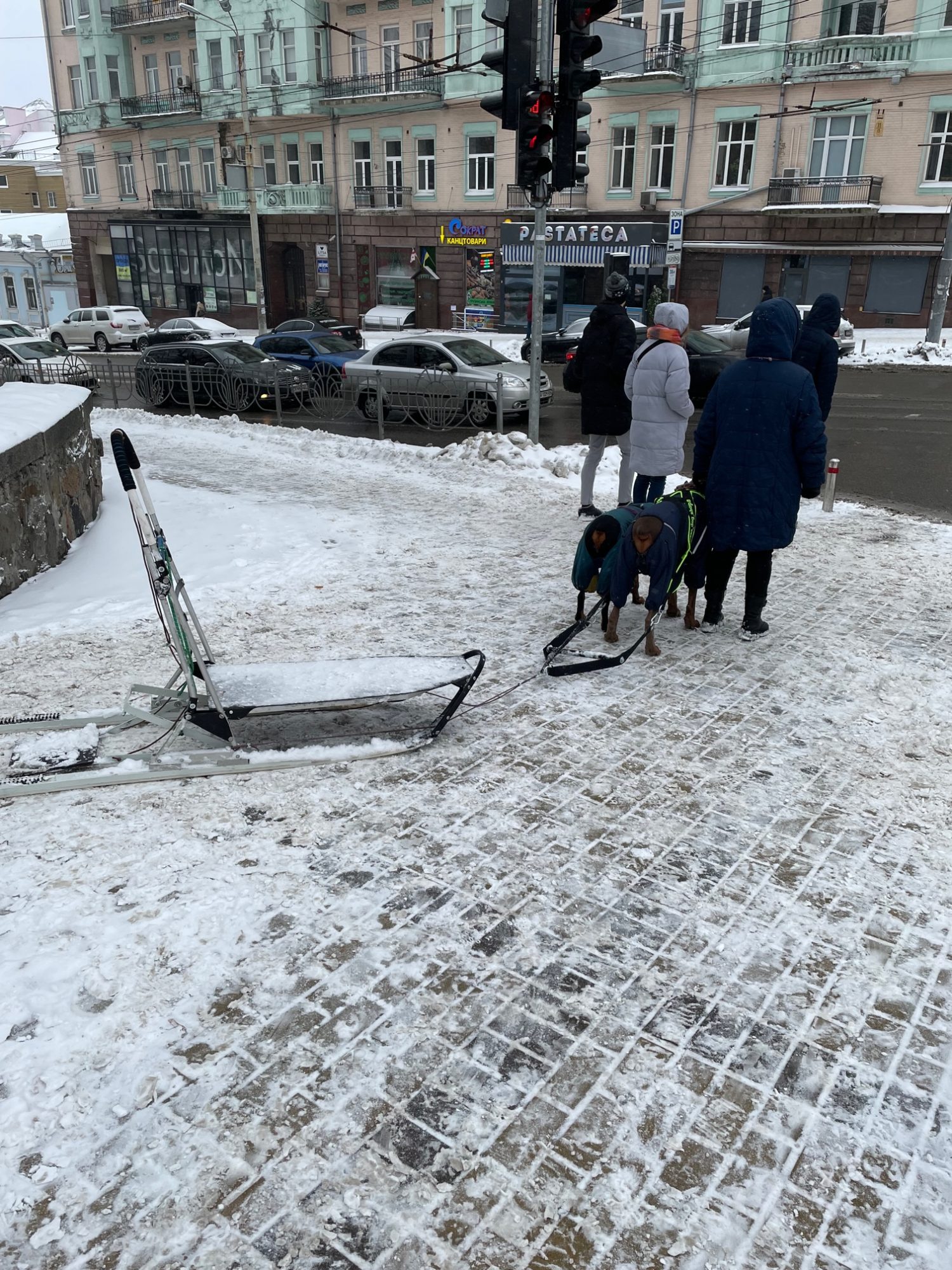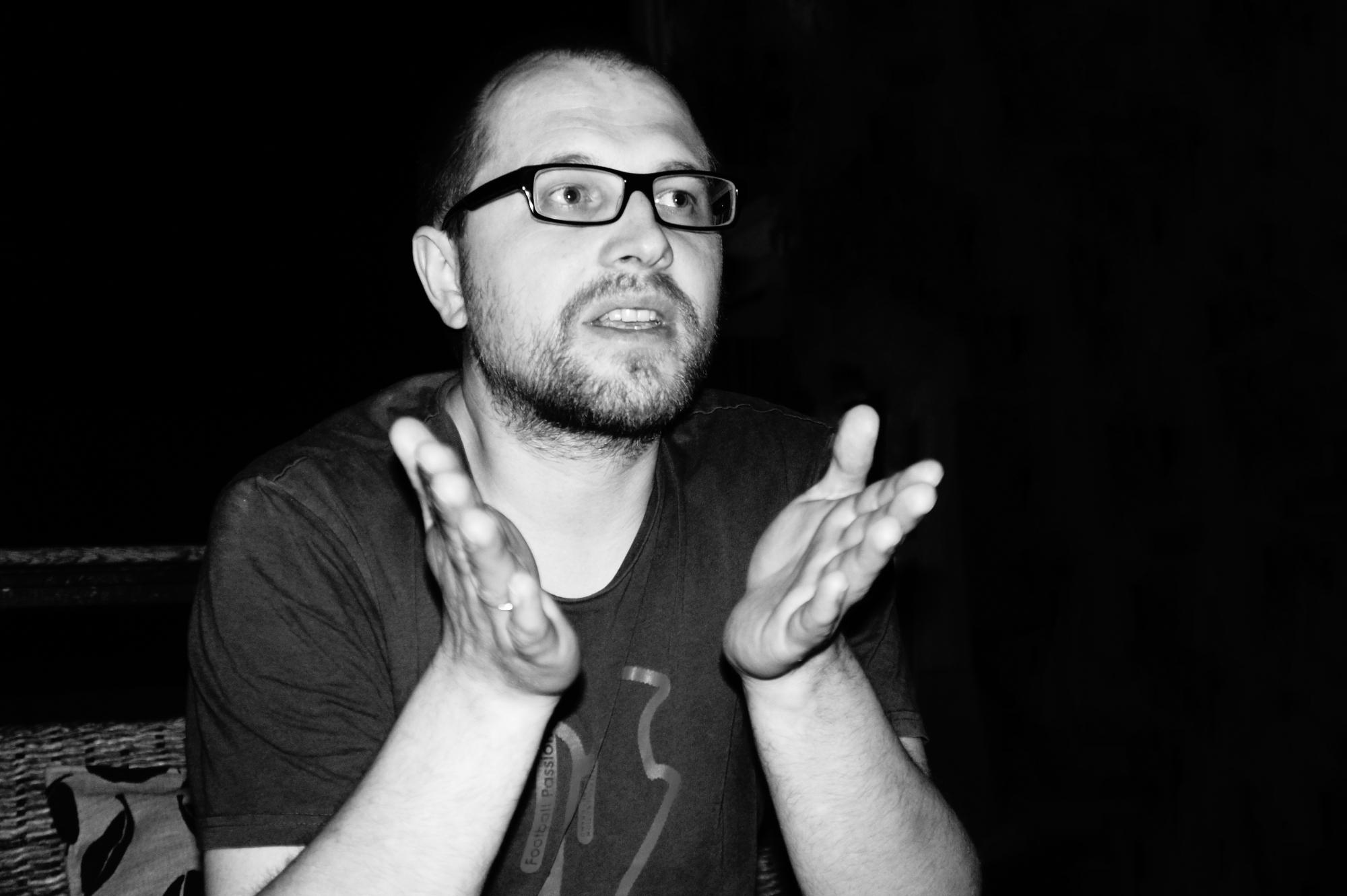Ресурс взаємного порятунку
На десятому місяці повномасштабної війни Росії проти України моїй собаці сняться кошмари. Не мені – істоті з пам’яттю і підсвідомим. А їй – трирічній собаці невстановленої породи, взятій якраз у день оголошення першого ковідного карантину з собачого притулку під Києвом.
Моя собака сприймає війну так, як би хотілося її сприймати мені. Вона вміє забувати і не вміє узагальнювати. Кожна окрема сирена повітряної тривоги чи вибухи близьких ракет, чи звуки протиповітряної оборони для неї – конкретні подразники, які ніколи не зливаються в єдину картину, в одне поняття – «війна».
«Собаки і війна» – тема для окремого епосу. Вигнані, залишені, загублені, контужені, травмовані, погорілі, вони страждають так само, як люди. Але ніяк збагнуть, чому світ раптом збожеволів.
Людина не лише завдає собакам болю. Вона також шукає в собаці розраду, підбирає вигнаних, годує залишених, лікує травмованих.
Собака для людини також поволі стає ресурсом виживання. Жінка без світла, води і тепла у квартирі в самому центрі воєнного 5-мільйонного Києва, у 7-градусний мороз перетворила своїх зовсім не тяглових породистих собак на особистий транспорт. І ні, українці – не народ Півночі. Зазвичай ми не запрягаємо взимку своїх собак у сани. І ця жінка робить це не тому, що не любить їх або вдається до експлуатації. Ні, вона шукає в них порятунку.
Наш світ не просто крихкий.
Моїй собаці сняться кошмари, які мали наснитися мені. Вона вже знає, що в сирені повітряної тривоги нічого доброго немає, бо тоді її сусідка за стіною захлинається виттям, а ми починаємо тривожно бігати по квартирі зі смартфонами, ловлячи зникомі сигнали інтернету епохи блекауту, аби визначити силу російського удару і вирішити, що нам робити цього разу: сидіти між двома стінами в коридорі чи спускатися в підземку метро.
Моя собака не любить ходити під землю. Однак усе це для неї не «війна». Просто щось зламалось у світі. Наш світ ламкий. Він ламається щодня і ніхто з нас не здогадується, якого з видів комфорту позбудеться завтра. Без електроенергії, тепла, інтернету, води і каналізації ми будемо грітися об наших собак, разом з ними шукатимемо інтернет і воду, а наш корм буде спільним, як колись. Але як навчитися забувати?
Eine Ressource zur gegenseitigen Rettung
Im zehnten Monat des Angriffskriegs Russlands gegen die Ukraine hat mein Hund Albträume. Nicht ich, ein Wesen mit einem Gedächtnis und einem Unterbewusstsein. Aber eine dreijährige Hündin einer unbestimmten Rasse, die ich an dem Tag, an dem die erste Covid-Quarantäne verhängt wurde, aus einem Tierheim in der Nähe von Kyjiw geholt habe.
Mein Hund nimmt den Krieg so wahr, wie ich ihn gerne wahrnehmen würde. Er kann vergessen und keine Schlussfolgerungen ziehen. Für ihn sind jeder Luftalarm, jede Explosionen in der Nähe oder das Geräusch der Luftabwehr nur spezifische Reize, die sich nie zu einem einheitlichen Bild, zu dem Begriff „Krieg“ – zusammenfügen.
„Hunde und Krieg“ – das ist ein Thema für ein eigenes Epos. Vertrieben, verlassen, verloren, geschockt, traumatisiert, verbrannt – sie leiden genauso wie die Menschen. Aber sie verstehen nicht, wieso die Welt um sie plötzlich verrückt geworden ist.
Der Mensch tut den Hunden nicht nur weh. Er sucht auch Trost in ihnen, nimmt die Streunenden auf, füttert die Verlassenen und behandelt die Verletzten.
Allmählich wird der Hund für den Menschen zu einer Ressource, um zu überleben. Eine Frau, die ohne Strom, Wasser und Heizung in ihrer Wohnung mitten im kriegsversehrten Kyjiw, einer Stadt mit 5 Millionen Einwohnern, sitzt, verwandelte ihre Hunde, die keineswegs Zughunde waren, bei Temperaturen von 7 Grad minus zu ihrem persönlichen Transportmittel. Und nein, die Ukrainer sind keine Menschen des Nordens. Wir spannen unsere Hunde im Winter normalerweise nicht vor den Schlitten. Und diese Frau tut das nicht, weil sie sie nicht liebt oder sie ausnutzen will. Nein, sie sucht in ihnen eine Rettung.
Unsere Welt ist nicht nur zerbrechlich.
Mein Hund hat die Albträume, die ich haben sollte. Er weiß schon, dass der Luftalarm nichts Gutes bedeutet, denn dann jault die Nachbarin neben uns auf, und wir rennen beunruhigt mit unseren Smartphones durch die Wohnung, auf der Suche nach dem schwachen Handyempfang bei Stromausfall, um das Ausmaß des russischen Angriffs zu bestimmen und zu entscheiden, was wir diesmal tun sollen: im Gemäuer des Treppenhauses sitzen oder in die Metro-Station gehen.
Mein Hund mag es nicht, unter die Erde zu gehen. Aber für ihn ist das alles kein „Krieg“. Für ihn ist nur etwas falsch mit der Welt. Unsere Welt ist brüchig. Sie zerbricht jeden Tag, und niemand von uns kann erahnen, welchen Komfort wir morgen entbehren müssen. Ohne Strom, Wärme, Internet, Wasser und Kanalisation werden wir uns an unseren Hunden wärmen, mit ihnen nach Internet und Wasser suchen, und unser Essen mit ihnen teilen, so wie es früher war. Aber wie werden wir lernen zu vergessen?
Übersetzung: Lukas Joura
Mutual Aid
In month ten of the full-scale Russian war on Ukraine, my dog is having nightmares. Not me, a being with memory and a subconscious, but her, a three-year-old mutt that I got from a dog shelter near Kyiv on the day the first COVID quarantine was announced.
My dog feels about the war the way I’d like to: she is capable of forgetting and cannot generalize. For her, each air-raid siren or explosion of a nearby missile, or the sounds of the antiaircraft warfare are concrete nuisances that never merge into a single picture, a single understanding —“war.”
“Dogs and war” is a topic for an entire dissertation. Exiled, abandoned, lost, bruised, battered, and burned, they suffer just like people. But there’s no way they can figure out why the world has suddenly gone mad.
But humans aren’t only causing dogs pain. They are also looking for solace in dogs. They take in the cast out, feed the abandoned, and nurse the sick.
Dogs have also gradually become a survival resource for humans. In the middle of 5-million-strong wartime Kyiv, a woman in an apartment with no electricity, water, or heat when it was -7 °C outside turned her non-sled dogs into a personal form of transportation. And no, Ukrainians are not a people of the North. We don’t normally hitch our dogs to sleighs in winter. She did this not because she didn’t love them or had resorted to exploitation. No, she was looking for salvation in them.
Our world isn’t just fragile.
My dog is having the nightmares that I should be having. She understands that the air-raid sirens can’t be good because her neighbour on the other side of the wall chokes on her howls and we start running around in a panic with our phones, trying to catch that elusive wi-fi of our blackout epoch to discover the strength of the Russian strike and decide what to do this time: take up a position between two walls in the hallway or go underground to the metro.
My dog doesn’t like going underground. But, again, all this isn’t “war” for her. Something has simply broken in the world. Our world is fragile. It is being broken every day and none of us can guess what comforts will be gone tomorrow. Without electricity and heat, we will warm ourselves on our dogs. With them, we will look for internet and water. And our food will be shared, as it once was. But how can we learn to forget?
Translation: Ali Kinsella
Teilen












